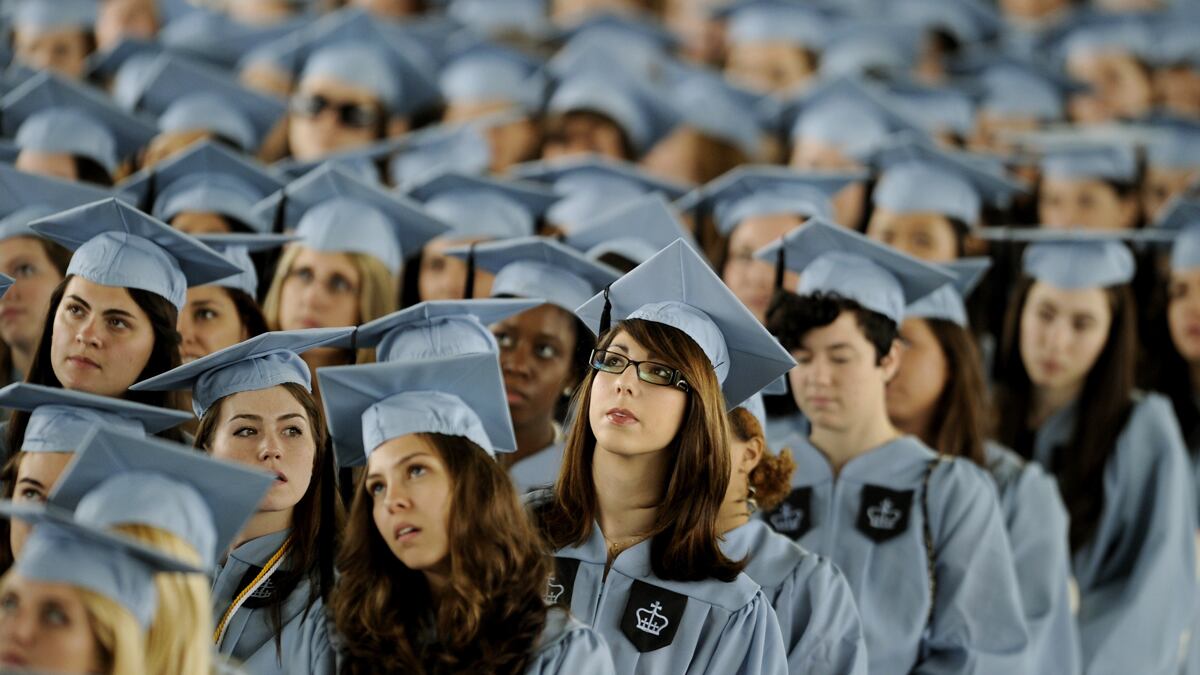This is the story of my education and my debt—a paradoxical combination. Ten years after college, I find myself wonderfully well educated and woefully burdened by payments that threaten many of the possibilities my schooling promised.

I grew up in a very small town in rural Massachusetts consisting mostly of lower-middle-class families, some of whom had been there for generations. We had cows, corn, and about 3,000 people. The public schools were not great. There was a lot of racism and sexism. There was also a great sense of community and a respect for the earth. People there are born, go to school, get married, grow old, and die within a 50-mile radius. The poor stay poor.
My parents were both from the area and had met at a nearby state college, which they both attended part time while working full time. Both financed their own educations with a combination of wages, loans, and credit cards. We had a small house, a big backyard, and good food from our garden. I always had music lessons, food in my stomach, and clothes on my back. I recognize in retrospect that providing this was no easy task.
My parents finished paying off their college debt just as I was finishing high school. They told me I could go anywhere—but I would have to pay for it. I didn’t want to go anywhere. I got into Columbia, and I wanted to go there. I was one of four students in the 30-year history of my high school ever to be admitted to an Ivy League school. After years of subpar schooling, I would really, finally, properly learn how to read closely, think critically, and write well. I was thrilled.
I knew it was expensive, but I had no concept of such a sum of money. I just assumed it would become manageable once I held my degree in hand and entered the workforce. So, at age 17, I took out loans. Columbia has need-blind admissions, meaning that it makes admissions decisions without having access to the students’ financial profiles. Many students without the means to pay tuition are admitted. These students are offered financial-aid packages like the one I had, a combination of loans, grants, and work-study. Columbia also expected my parents to help with tuition, something they neither could afford nor had planned to do. By moving some of the burden to the parents, the school claims it is protecting the student. In the end, this meant more debt for my parents, whom I may end up supporting in their old age anyway. But, we all agreed that this was a great opportunity, my chance to “get out” of the small town and to “move up” in the world.
At Columbia, I studied the arts and writing and worked a mélange of work-study and summer jobs. When my classmates went to their summer homes in the Hamptons, I got a job answering phones in the chemistry department. During the winter I worked as a security guard, I sorted mail in a mailroom, and I catalogued music in a library. When things got slow at work, I read. I had a lot of reading to do.
When we graduated in 2001, I wanted to continue my schooling and become a professor. Some of my friends, who were carrying debt, made more “responsible” decisions. My roommate, a talented musician and mathematician, gave up the cello and took a job as an investment banker. The guy I was dating, a political-science major and the son of a single, immigrant mother, also went to Wall Street. Both said they took such jobs to be free of their loans.
After my MFA, I found myself with so much debt that I would have to pay roughly $1,000 a month for the next 20 years. I recognize that this amount (about $120,000 in principal) is becoming more and more standard. Four-year private college costs have more than doubled since I was an undergrad. Columbia now costs $62,161 a year. A two-year master’s degree in my department at NYU carries a price tag of $54,000 in tuition and fees alone.
I first took a day job as a grant writer at a not-for-profit art institution. I felt good about doing work I believed in, but the pay wasn’t enough to meet rent and keep up with my minimum loan payments. I took on work in the evenings tutoring wealthy high-school students in math. This paid well and allowed me to keep my head above water and my credit intact. But I was exhausted, barely making a dent in my debt, and finding little or no time to pursue my original ambitions.
I had always wanted to be a professor, and I recently returned to school to get my Ph.D. in media and cultural studies (a combination of art, philosophy, and technology studies). I knew I wouldn’t make a lot of money, but I thought it would be enough. It turns out it won’t be. The average starting salary for a tenure-track professorship in visual and performing arts is about $50,000. This means about $4,000 a month before taxes. One quarter of that will go to paying my loans. This will leave me $3,000 a month for rent, groceries, supporting my (now imaginary) children, helping my (very real) aging parents, travel and transportation, extraneous health-care costs, saving for my retirement, utilities, credit-card debts, saving for my children’s education, and perhaps going out for dinner now and then. It’s not enough.
How can it be that the education required to become an educator is so expensive that a regular, middle-class American cannot afford it? Where is all this borrowed tuition money going, if not to sustaining the teachers? Does this mean that the only ones who get to teach, and to shape intellectual discourse, are those who can afford to pay their way into that discourse?
Those members of the middle and working class who do go to school must take on so much debt that they would seem to have no choice but to pursue the most lucrative career possible. As I was finishing college, this meant taking a job on Wall Street. As the job market has shrunk, college graduates faced with huge debts don’t even have the option to “sell out.” What they do have is a shocking and sudden realization that they are screwed and that there is something wrong with a system that asks a 17-year-old to sign her life away in order to try to improve her position. I believe the Occupy movement grew partly out of this realization, as have more recent initiatives such as the “strike debt” campaign and House Resolution 4170 (the Student Loan Forgiveness Act of 2012). Students, graduates, professors, and congressmen alike have come to realize that the current state of economic affairs is not only unfair but unsustainable.
There should be another way of doing it. The premise of a liberal-arts education is the idea that school is there for something more than earning power. In fact, it is based on the idea that a human life can serve a purpose beyond earning. As one of millions who will return to school this August, that idea is at the root of the questions I am asking myself. What does taking “responsibility” really mean? There is an American proverb that says, “If you owe the bank a hundred thousand dollars, the bank owns you. If you owe the bank a hundred million dollars, you own the bank.” Individually, we are owned. Collectively, we own the bank. How do we want our lives to be spent? What are we, collectively, going to do with this mess?






